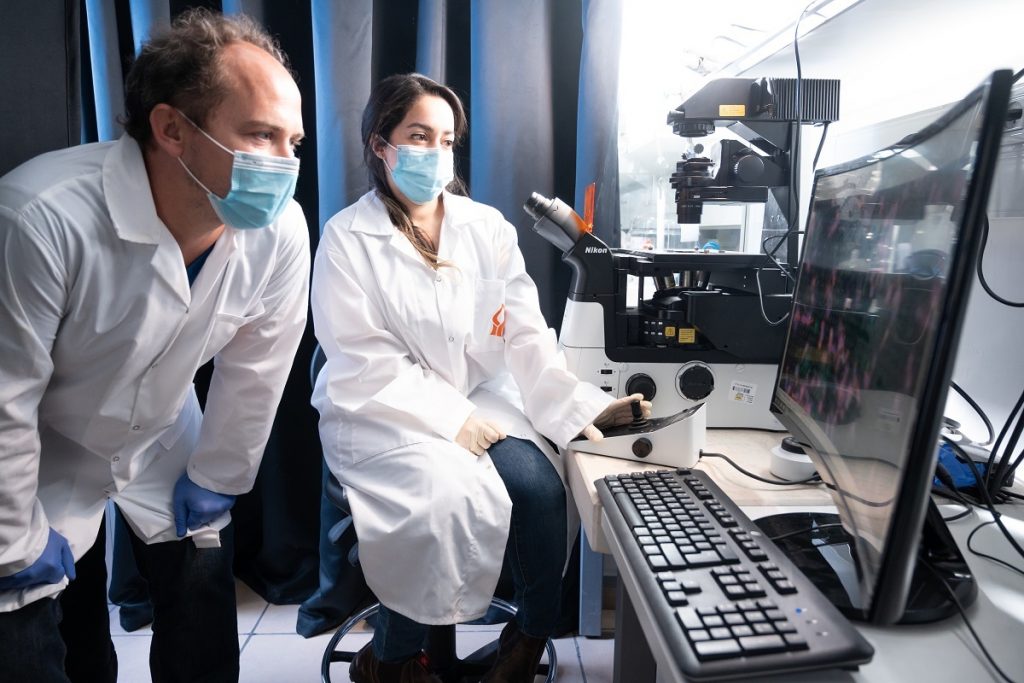Scientists from the Ben-Gurion University of the Negev (BGU) are currently developing anti-viral coatings for surfaces that could potentially help reduce the spread of the coronavirus.
While the SARS-CoV-2 coronavirus is mainly transferred between people via respiratory droplets, it is known that the virus can live on surfaces for days.
These novel surface coatings contain nanoparticles of safe metal ions and polymers with anti-viral and anti-microbial activity and are said to have a long-lasting effect, researchers indicated in a BGU statement.
The researchers received financial support from the Israel Innovation Authority, in response to a call for proposals for coping with the coronavirus. The project is one of 27 proposals submitted to the IIA by BGN Technologies, the technology transfer company of BGU, based on innovative and diverse inventions of researchers at BGU and the National Institute for Biotechnology in the Negev (NIBN) for the prevention, diagnosis and treatment of COVID-19.
Prof. Angel Porgador, from the Department of Microbiology, Immunology and Genetics at Ben-Gurion University and the National Institute of Biotechnology in the Negev (NIBN), and Dr. Mark Schvartzman, the Department of Materials Engineering at BGU led the research.
Certain metals can be lethal for viruses and bacteria, even in small quantities, and are not poisonous to humans. In proof of concept experiments, the researchers assessed the effect of surfaces coated with nanoparticles of various metals on the infectivity of lentiviruses, which belong to the HIV family, in human cells.
Findings show that surfaces coated with copper nanoparticles strongly block infection of the cells by the virus. These ongoing experiments show a huge potential for copper ions in preventing surface-mediated infection with SARS CoV-2.
Based on these findings, the researchers are developing anti-viral coatings that can be painted or sprayed on surfaces. The polymer-based coatings contain nanoparticles of copper and other metals, which will enable the controlled release of metal ions onto the coated surface. Because the release of ions is extremely slow, the coating can be effective for a long period of time — weeks and even months, and it will reduce the infectivity of the virus particles by more than 10-fold, according to the researchers.
Sign up for our free weekly newsletter
Subscribe“It should be noted that until now using such metals for anti-viral applications has encountered significant challenges due to the nature of the metals, such as the tendency to oxidize and corrode,” said Schvartzman. “Nanoparticles provide a solution to these obstacles. Another advantage of nanoparticles is the large surface-area-to-volume ratio, which results in an efficient antiviral surface area using a relatively small amount of metal. Additionally, nanoparticles of antiviral metal can be easily embedded in a polymer that can coat the relevant surfaces for extended periods of time.”
Prof. Porgador said there is a clear need for durable anti-viral coatings that can be sprayed or painted on surfaces, just like paint or varnish, and that will prevent viral transmission.
“These surfaces can include handles, buttons, railways or any other public surface that poses increased danger, in particular in places with a high concentration of potential carriers, such as hospitals or clinics.,” she added.
Prof Porgador also said that it was important to remember “we are developing coatings that will be effective not only against the coronavirus but also against other viruses, as indicated in our proof of concept experiments, and also against bacteria, so they will be relevant for a wide range of applications.”
“The product will be efficient as a general anti-viral and anti-bacterial coating. It can be applicable for medical settings, as an anti-pathogenic substance in places with increased risk of contamination, such as hospitals, but also for home use, and in public spaces such as schools, airports, public transportation and cinemas,” said Josh Peleg, CEO of BGN Technologies, “We see a widespread and multidisciplinary academic commitment for finding solutions to current medical and financial challenges as well as to the challenge of returning to normalcy once the pandemic wanes.”
The research of Prof. Porgador and Dr. Schvartzman is part of the coronavirus research task force, founded by Prof. Daniel Chamovitz, President of BGU.
Related posts

Israeli AI Safety Tool Among TIME’S Best Inventions For 2024

TAU Team Discovers Mechanism To Eliminate Cancerous Tumors

Ashdod Port Investing In Startups As Part Of Innovation Strategy




Facebook comments